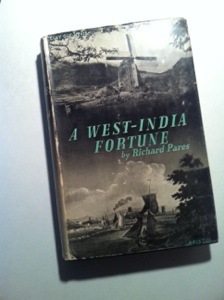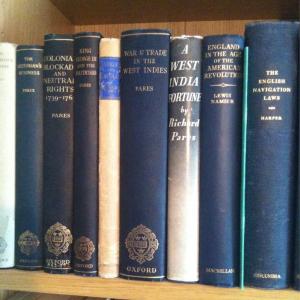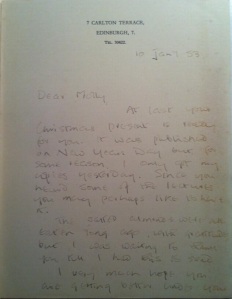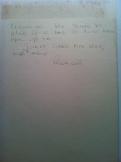 One of the first blogs about the Glasgow- West India trades concerns an English historian writing about a Dorset family who had plantations in Nevis and a merchant house in Bristol. Do bear with me…
One of the first blogs about the Glasgow- West India trades concerns an English historian writing about a Dorset family who had plantations in Nevis and a merchant house in Bristol. Do bear with me…
In a period of historical research, the researcher sometimes finds a historian’s work that profoundly changes the way they think about their topic. In my own research, I have been very fortunate to be metaphorically standing on the shoulders (nanos gigantum humeris insidentes) of Richard Pares CBE (25 August 1902 – 3 May 1958). Described as the ‘the outstanding historian of his time’ alongside contemporary Sir Lewis Namier, Pares continues to shape the way historians think over half a century after his death.
A West India Fortune, published in 1950, altered my thoughts about the relationship between merchants and planters and their involvement with the West Indies. Pares used a small sliver of the voluminous Pinney Collection – most of it now held in the University of Bristol Special Collections – to trace the fortunes of successive generations of the Pinney family of Dorset, who owned plantations in St Christopher and Nevis. Pares set out to ‘practice what he preached’ by producing an economic history based on primary records of a representative family and West India merchant firm (A West India Fortune, p.vii). In doing so, he illuminated a two century long connection with the West Indies that started with a sojourner, Azariah Pinney travelling to Nevis in the late seventeenth century and ends with John Pinney operating a successful merchant house in Bristol after the 1780s. In between, Pares produced outstanding chapters on plantation management, West India finance, shipping and debt as well as the sugar market of Bristol. The text was later complemented by a shorter article on the London-West India merchant house of the Lascelles. Fortunately, Pares had worked on the Lascelles records in London before a German air raid in the Blitz of 1940 destroyed a lot of the material (although S.D. Smith recently studied the family in much more detail in Slavery, Family, and Gentry Capitalism in the British Atlantic). In his article, Pares outlined the business as well as the dangers for students returning from the West Indies to England for education: ‘Sam could not go back to school after the Christmas period of 1755, because he had been “unfortunately drawn into the embraces of a vile wicked Strumpet who gave him the foul disease”. He was reported to be a “sincere penitent”…when he was cured and ready to return to school’. (The Historians Business, p.217).
In doing so, he illuminated a two century long connection with the West Indies that started with a sojourner, Azariah Pinney travelling to Nevis in the late seventeenth century and ends with John Pinney operating a successful merchant house in Bristol after the 1780s. In between, Pares produced outstanding chapters on plantation management, West India finance, shipping and debt as well as the sugar market of Bristol. The text was later complemented by a shorter article on the London-West India merchant house of the Lascelles. Fortunately, Pares had worked on the Lascelles records in London before a German air raid in the Blitz of 1940 destroyed a lot of the material (although S.D. Smith recently studied the family in much more detail in Slavery, Family, and Gentry Capitalism in the British Atlantic). In his article, Pares outlined the business as well as the dangers for students returning from the West Indies to England for education: ‘Sam could not go back to school after the Christmas period of 1755, because he had been “unfortunately drawn into the embraces of a vile wicked Strumpet who gave him the foul disease”. He was reported to be a “sincere penitent”…when he was cured and ready to return to school’. (The Historians Business, p.217).

I was now hooked on Pares and the inner geek in me set out to try and acquire as many first edition as I could. Most of these are out of print, others are quite rare and all can be expensive. A retired Professor of History at the University of Glasgow gave me a pristine copy of A West India Fortune with cover, which is quite valuable to purchase but priceless to me. I also managed to acquire a signed copy of King George III and the politicians : the Ford lectures delivered in the University of Oxford, 1951-52 (1953), which contained a note evidently  written when Richard was Professor of History at Edinburgh and lived in 7 Carlton Terrace, just off Calton Hill and a short walk to the University as well as to the Scottish Record Office and National Library. In the note, Richard thanked the recipient of the book, Molly, for the almonds before affectionately signing off Richard.
written when Richard was Professor of History at Edinburgh and lived in 7 Carlton Terrace, just off Calton Hill and a short walk to the University as well as to the Scottish Record Office and National Library. In the note, Richard thanked the recipient of the book, Molly, for the almonds before affectionately signing off Richard.  This small piece of Pares family history in Edinburgh masks a personal tragedy. Just after taking the position at Edinburgh in 1945, he was diagnosed with Progressive Muscular Atrophy, and had to retire from duties in 1954. Richard returned to Oxford where he was appointed a Special Research Fellowship at All Souls. He used his limited time to work on material accumulated before 1939, resulting in Yankees and Creoles: the trade between North America and the West Indies before the American Revolution (1956) as well as a short monograph, Merchants and planters, (1960). Still at the height of his powers, Pares used the article to re-evaluate his views on the economic relationship with Great Britain and the sugar colonies and famously stated that Adam Smith was wrong as he viewed Empire as an economic drain. The text was published posthumously after Richard died on 3 May 1958. But what a legacy.
This small piece of Pares family history in Edinburgh masks a personal tragedy. Just after taking the position at Edinburgh in 1945, he was diagnosed with Progressive Muscular Atrophy, and had to retire from duties in 1954. Richard returned to Oxford where he was appointed a Special Research Fellowship at All Souls. He used his limited time to work on material accumulated before 1939, resulting in Yankees and Creoles: the trade between North America and the West Indies before the American Revolution (1956) as well as a short monograph, Merchants and planters, (1960). Still at the height of his powers, Pares used the article to re-evaluate his views on the economic relationship with Great Britain and the sugar colonies and famously stated that Adam Smith was wrong as he viewed Empire as an economic drain. The text was published posthumously after Richard died on 3 May 1958. But what a legacy.
Selected Publications (incomplete- for now)
- Public records in British West India islands, reprinted from Bulletin of the Institute of Historical Research vol. 7 (1930), pp. 149-157.
- War and trade in the West Indies, 1739-1763 (1936, 1963)
- The economic factors in the history of the Empire Reprinted from: Economic history review, vol. 7, no. 2 (May 1937), pp. 119-144.
- The manning of the navy in the West Indies, 1702-63 Offprint from: Transactions of the Royal Historical Society, 4th ser., v. 20, 1937, pp. 31-60.
- Prisoners of war in the West Indies in the 18th century Reprinted from. Journal of the Barbados museum and historical society (1937).
- Colonial blockade and neutral rights, 1739-1763 (1938, 1975).
- West-India fortune (1950, 1968).
- King George III and the politicians : the Ford lectures delivered in the University of Oxford, 1951-52 (1953)
- Yankees and Creoles: the trade between North America and the West Indies before the American Revolution (1956)
- Essays presented to Sir Lewis Namier, Edited by Richard Pares and Alan J. P. Taylor (1956, 1971).
- Limited monarchy in Great Britain in the eighteenth century (1957, 1967)
- Merchants and planters, Economic History Review. Supplement 4. (1960)
- The historian’s business, and other essays edited by R. A. and Elisabeth Humphreys; with an introd. by Lucy S. Sutherland. (1960).

Heard him, wheelchair-bound, on the elder Pitt in the autumn of 1955, and much later read Merchants and Planters and Yankees and Creoles when I began discovering Highland slaveownership. There’s a single, simply written paragraph in Merchants and Planters (originally, I think from a lecture) which sums up Caribbean slavery succinctly and concludes “I can only feel anger and shame”. Everything you say about him is right.
Jim. What a fascinating little snippet of trivia. Thanks for this. Pares’ work has been very influential. Amazing you saw him in action.
Is there a legal copy of this article to download – have searched without success. “Public records in British West India islands”
Hi Neil. Yes, a Google searhc throws up several possibilities. It can be downloaded from WileyOnlne – for a cost or for free if you have access to academic databases.http://onlinelibrary.wiley.com/wol1/doi/10.1111/j.1468-2281.1930.tb00560.x/full